The Yukon is a harsh environment, and it’s particularly hard staying stylish in it, whether you’re a lumberjack or a bear. Thank goodness for Yukon Salon.
At a glance: Yukon Salon is a game by David Fooden for 2 to 4 players of all ages, and takes about 15 minutes to play. It’s currently seeking funding on Kickstarter, with a pledge of $15 for a copy of the game (or a higher pledge if you’d like a custom portrait based on a friend or a pet). I would say the game would work for probably ages 8 and up—the rules aren’t too difficult to learn.
New to Kickstarter? Check out our crowdfunding primer, and visit our curated page for more projects we love.

Components
- 18 Client cards
- 32 Style cards
- 4 reference cards
- 2 wooden dice
Note: since my review is based on a pre-production prototype, I can’t judge final component quality, so I’ll focus on the look and the gameplay.
The clients are all lumberjacks and bears, illustrated in a wonderful woodcut style, and the styles are beards/hairdos with names like The Jupiter and The Viking. The style cards can be placed on top of the bear cards as hairdos or, turned upside-down, below the lumberjack cards as beards. The results are hilarious and fantastic:
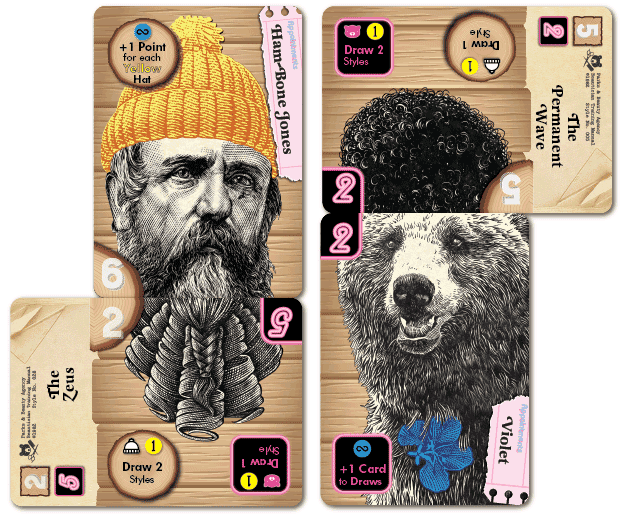
The lumberjacks all have epithets in their names, like Ham-Bone Jones and Naughty Pierre, and the bears all have traditional women’s names like Muriel and Doris.
In addition, each client card has a point value and special effect. Each style card has two values and two effects, depending on whether the card is played as a beard or a hairdo.
How to Play
You can download a free print and play here (which includes the rules) if you’d like to try out the game for yourself before backing.
The goal of the game is to score the most points by successfully matching clients to styles.
To set up, you shuffle the clients, and then make a deck of clients based on the number of players. Then, shuffle the styles and deal out styles to players based on the number of players and player position—the first player will have the fewest styles, for instance. Then draw 4 clients from the deck and place them face-up in the center of the table. This is called the Lobby.

On your turn, you get to take 2 actions (and you may repeat the same action if desired):
- Draw a style card
- Seat a client
- Style a client
Draw a style card: Just what it says: draw a style card from the deck.
Seat a client: Take a client from the lobby and place it front of you. At the start of the game you only have one seat, so you can only seat one client at a time, but some cards may increase your seat capacity. (Immediately place a new client in the lobby from the deck.)

Style a client: Play any style card from your hand onto your seated client—hairdos for bears, beards for lumberjacks. When placed, the numbers on the client and style card will line up. You must roll the dice to see if the client approves of the style: your roll must be equal to or higher than the sum on the two cards. If your roll succeeds, the client approves and is satisfied—you move them to the side, and then activate their bonus abilities. Each client and each style has a bonus ability—some are marked “1” to indicate that it’s an immediate one-time bonus, and some are marked “∞” to indicate that they are ongoing permanent abilities.
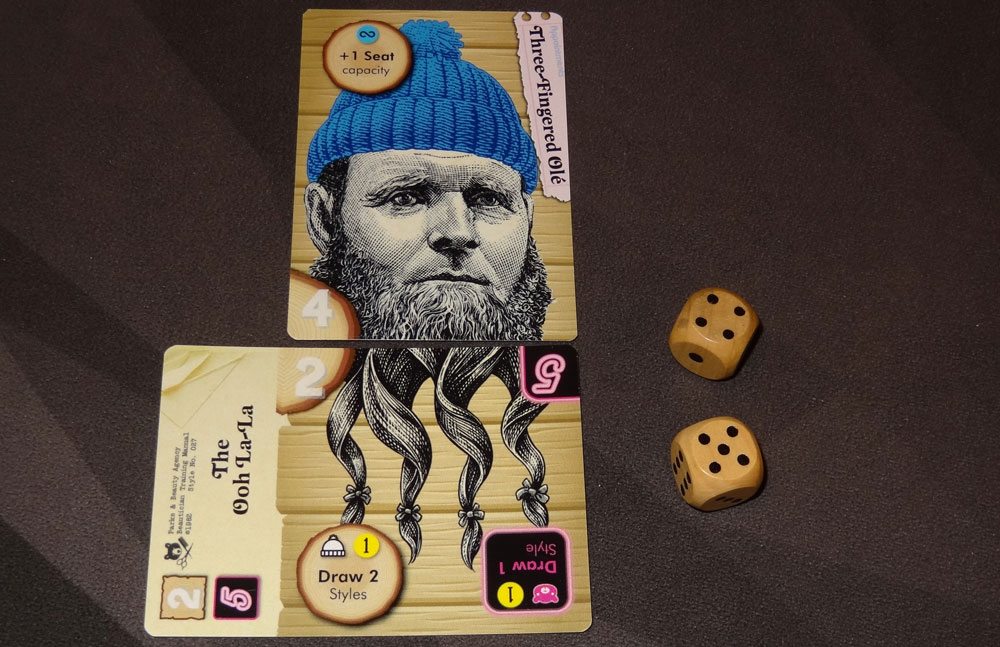
If your roll fails, you’ll have to discard the style but keep the client. However, before you discard a style, you do get some opportunities to convince the client. You may discard any number of style cards from your hand, increasing your roll by 1 for each card discarded. You may also get one re-roll per style attempt by talking your client into it. You must give them one claim per client value, and you must make claims that haven’t been used before during this game. (As the rules explain: “Yes, this means you need to talk to the card on the table in front of you as if you want to convince it to wear a ridiculous hairstyle.” Once you’ve made enough claims, you may reroll the dice.
When the last client in the deck has been seated, that player finishes their turn, and then every other player gets one more turn, and then the game ends.
You score only for styled clients—each one is worth the value of the client and the style. Some card abilities will give bonus points, too. Ties are broken by most clients, and then by the highest-valued client-style combo.
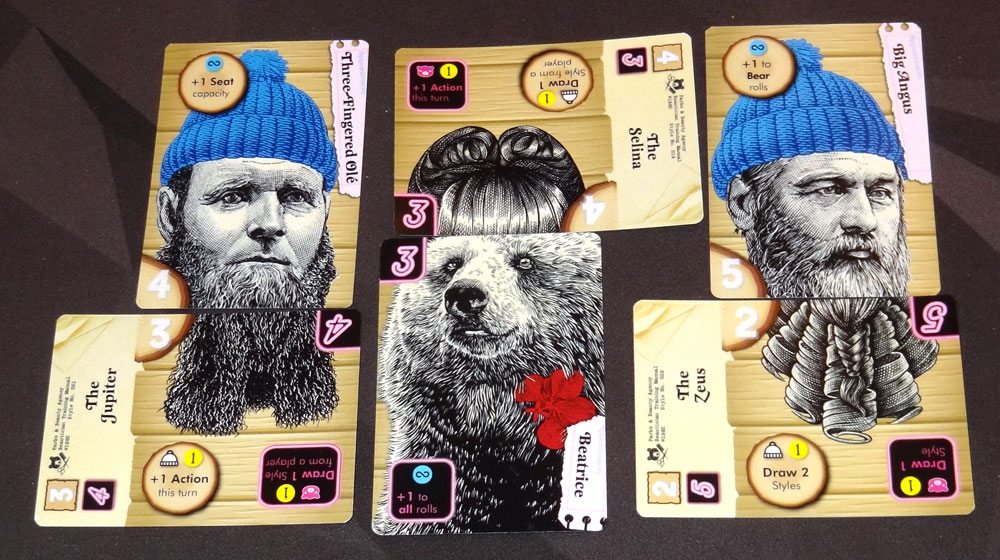
The Verdict
I first played Yukon Salon in 2015, when Dave Fooden brought an early prototype with him to XOXO, so I know he’s been working on it and playtesting it for quite some time, and the gameplay has been refined since then. The basic premise, though, remains just as silly—and it’s hard not to smile when you see your clients all styled up, whether they’re lumberjacks or bears.
The gameplay itself is fairly simple to teach—draw a style card, get a new client, or attempt to style your client. But within that simple structure and the humor there’s still room for some strategic decisions. For instance: when choosing clients and styles, do you go for lower combinations so you’re more likely to succeed with your dice roll, or do you pair high-value clients with high-value styles in the hopes of scoring big? The styles have complementary values depending on whether they’re beards or hairdos, so you have a little bit of control over how difficult your dice roll will be.

The mix of bonus abilities is also important to consider. There are some clients that will give bonus points for collecting others with the same color toques or corsages; some cards will increase your dice rolls for particular types of clients; some let you draw more style cards. Having a lot of style cards in hand is also a good way to succeed on higher-value pairings, because you can discard cards to add to your roll.
Even so, you have a limited amount of time—there are only so many clients available, and once they’re all gone, the game is over. If you find yourself without any clients to seat, you may waste your last turn. That’s where the extra seating capacity comes in because then you can get a few extra clients from the lobby to style on your last turn.

And then, of course, there’s the talking to the cards. It’s another rule that increases the silliness factor, because of course talking to your card has no real mechanical effect—you get one chance to reroll the dice. But it is a lot of fun to hear what players will say to a lumberjack or a bear so that they’ll accept a particular style, and since each claim has to be unique, you start getting quite bizarre once several people have failed rolls. My oldest daughter was disappointed during one game because she kept succeeding at her initial rolls—she really wanted a chance to talk to her clients about their choices. It’s also fun to imagine the bears and lumberjacks chatting with each other in the salon and commenting on their hairstyles and beard fashions.
Yulon Salon is a light, casual game—it’s pretty short and you can play it with both kids and adults. It probably won’t be the main (or mane?) event at my game nights, but it will be another fun one to kick off the evening or a quick filler between games. Plus, it’s a small package and is easy to pack along for on-the-go gaming. If you look at the cover and think “that’s fantastic!” then you’re probably in the target audience for it. (If the cover makes you say “Huh? I don’t get it” then you might be overthinking it and may not like it as much.)
For more information, visit the Yukon Salon Kickstarter page!
Disclosure: I received a prototype of this game for review.
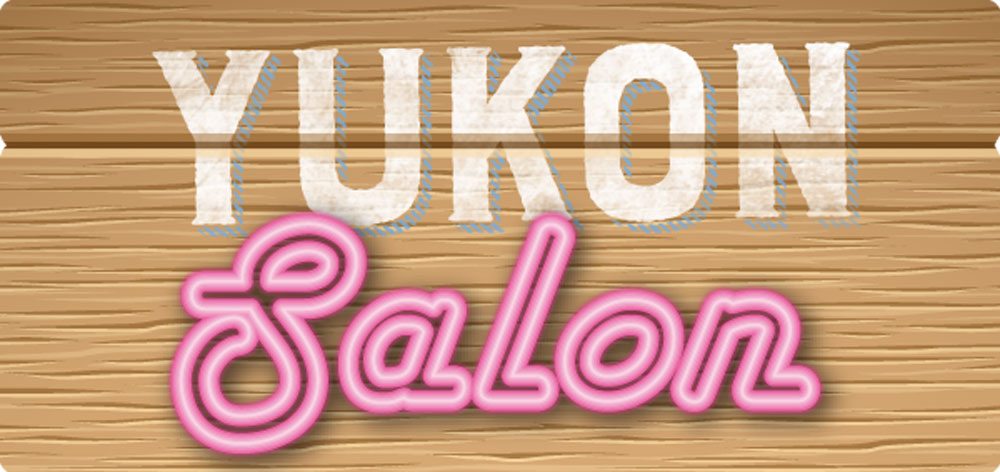



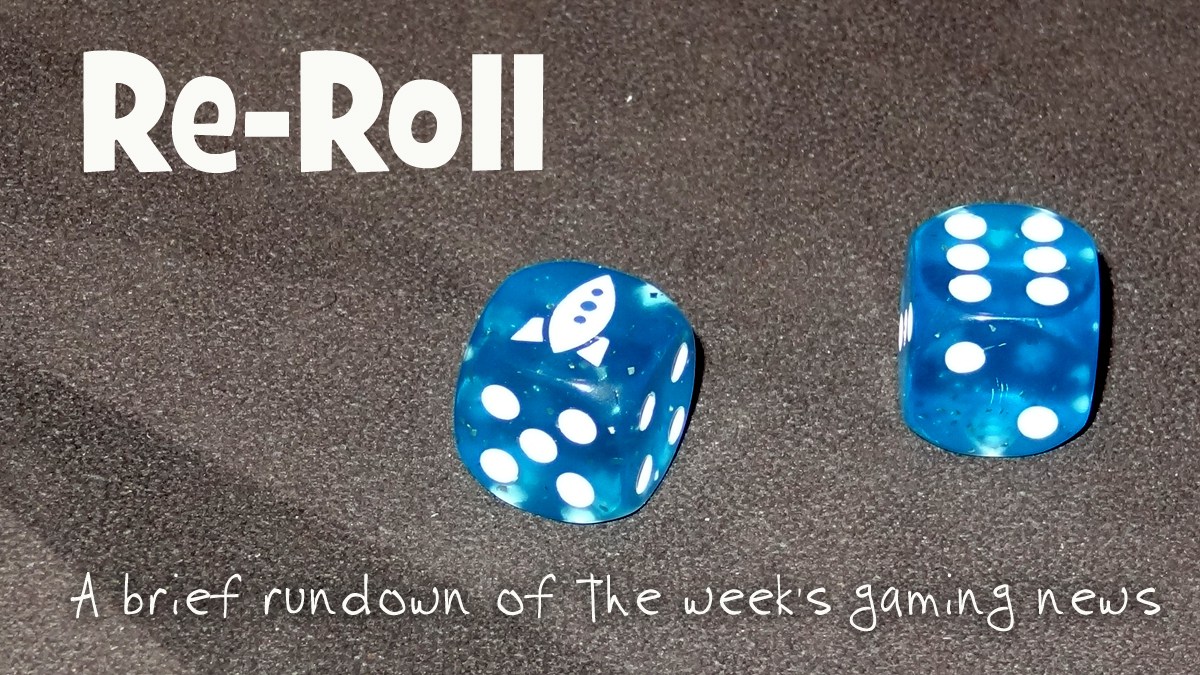
Here’s a tabletop Kickstarter that should be on your radar: https://www.kickstarter.com/projects/mindbottlinggames/dice-throne